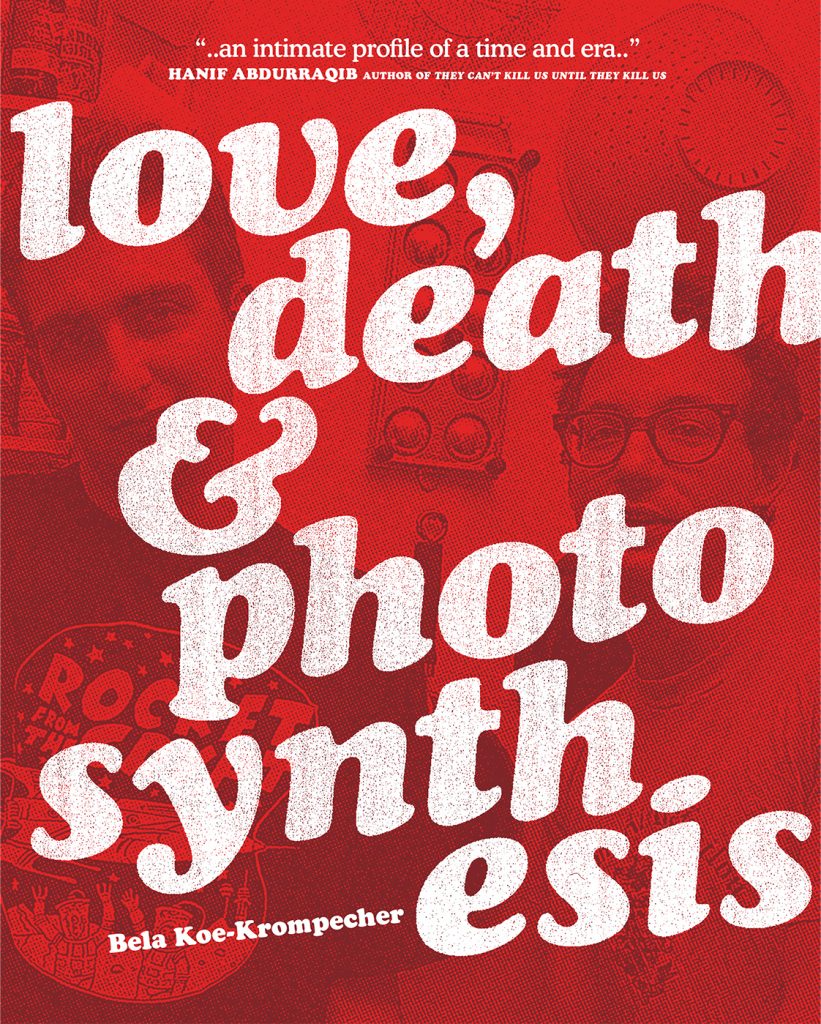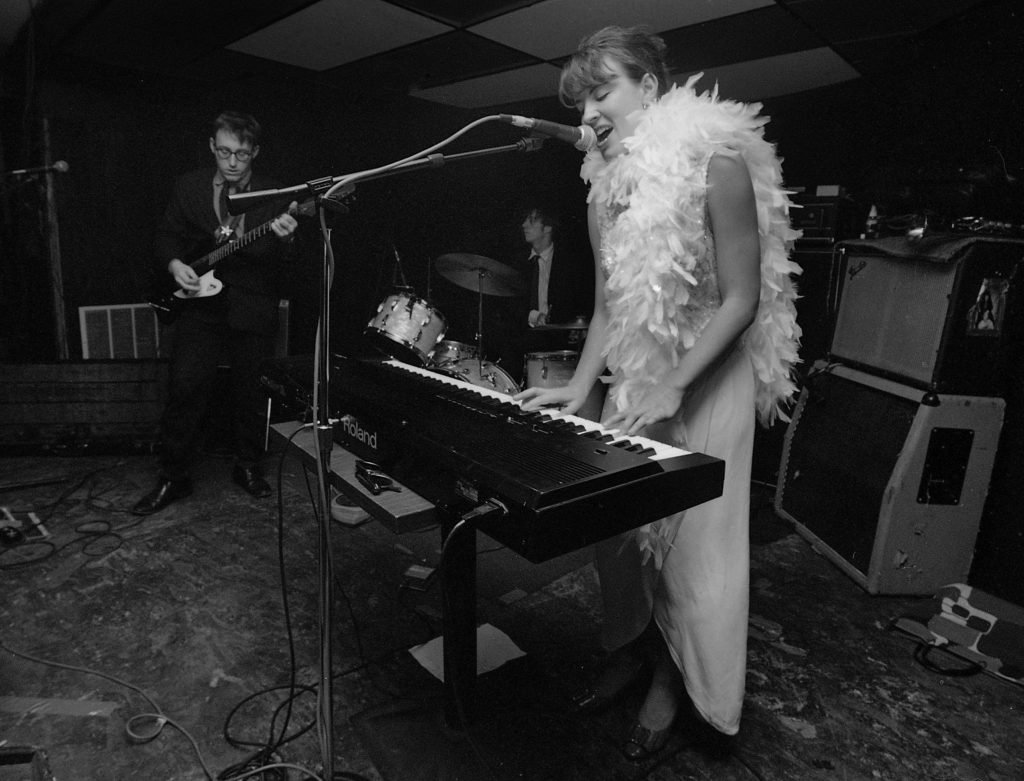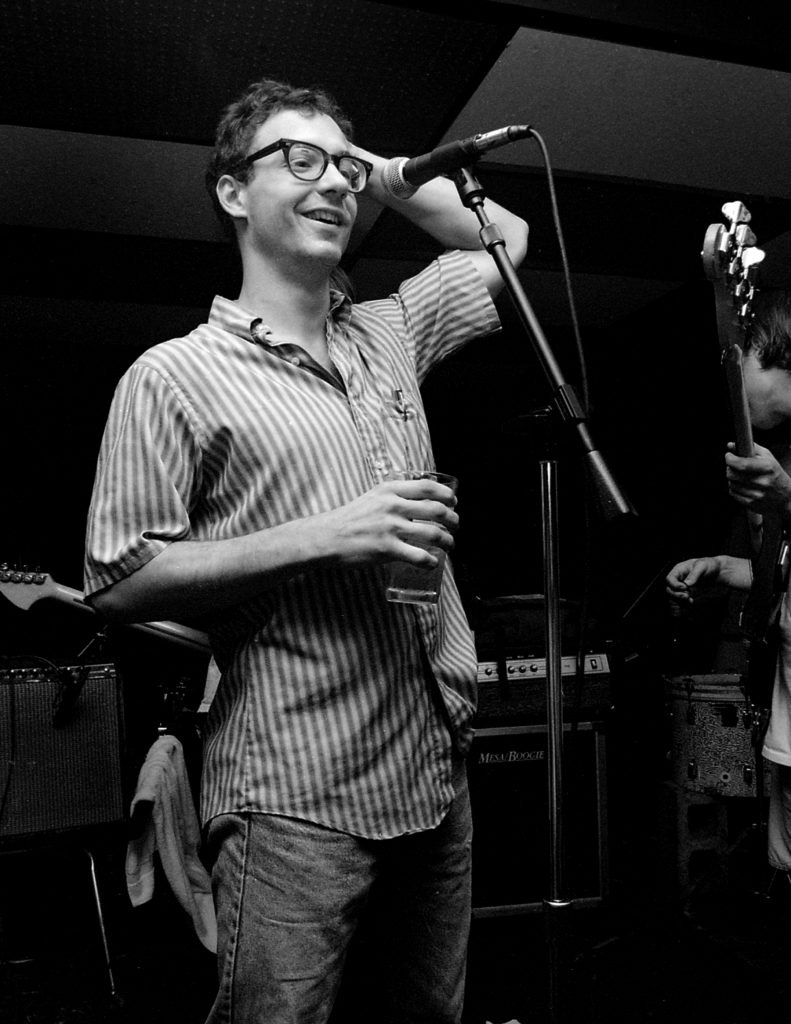
The following excerpt is from Love, Death & Photosynthesis by Bela Koe-Krompecher, out August 13 via Don Giovanni. Koe-Krompecher was a huge part of the thriving Columbus, Ohio, indie-rock scene of the ’90s, co-owning a cool record store (Used Kids) and a hip label (Anyway), as well as promoting shows and writing about underground rock ‘n’ roll. With this lifestyle-defining music as its soundtrack, Love, Death & Photosynthesis focuses on the special friendships between Koe-Krompecher and musicians Jenny Mae Leffel and Jerry Wick, both of whom are no longer with us. It’s a deeply moving music memoir about love, life, loss, addiction and—for Koe-Krompecher—recovery and redemption.
1998
Jenny spoke with an almost Southern accent; her voice was hard—not just from childhood experience. Western Ohio is hard. A struggle for survival, where scuffed knuckles and the worry of the next paycheck are ever present, and eviction or foreclosure is just around the corner. Though she spoke indelicately, her knowledge of language revealed itself in written form. She was a lovely writer—both in her crafting of short stories and her actual handwriting. In song, Jenny’s voice slid from a simple, innocent delivery to a husky pillow drenched in Maker’s Mark. Then came the pain she let slip out in an ethereal gasp. Hers was a voice that fit nowhere; she lacked the polish that provided so many female artists an avenue of acceptability in the man’s world of indie-rock. She was too pop and sing-song-y to attract the punks, yet too bold and outrageous in personality for those who wanted their female singers to provide solace—to not only sound pretty but to be pretty, to act pretty. On her first tour T-shirt, instead of cities she wanted to list her sexual conquests on the back, with a nod to the Columbus nightclub Stache’s motto, “Stache’s… I Been There.” She wanted to write, “Jenny Mae, You Been There,” followed by the name of the lover and the date she slept with him or her. Laughing as she described the shirt, “Actually, now that I think of it—it would have to be tour gown to get all the men on there.”
She fit not in a sexist and classist world.
Jenny was confounding as an artist, at times brilliant and at others a pathetic mess who would rather smash her equipment and drink beer than practice or play shows out of town. It was as if every time something was planned for her, a collective breath would be held and more times than not the breath would be blown towards the floor as a small community would slowly shake their heads. She sang without misgivings. At times, depending on her alcohol intake, she could go tragically off-key, not unlike Guided By Voices’ Bob Pollard, while at other times, her breathy voice would crush, as evident on her song “Ho Bitch,” which is one of the greatest songs on living with mental illness that I have ever heard. Which would it be tonight?
The Middle East nightclub, Boston. The club is sold out, it is packed. We get there mid-afternoon. The night before Jenny played in New York with Neko Case and Amy Rigby in a small club that was overstuffed from front to back. Jenny was featured in Time-Out New York and Paper, both carrying color photos of her and highlighting the show. While we sipped our drinks in the front bar at the Middle East waiting for her soundcheck she told me that “Neko Case is a fabulous kisser. Man, she is hot.” Tonight was a big gig. This was Cat Power’s first show back in Boston in nearly three years. There are only the two bands that night; the Boston Phoenix has a preview of the show and writes extensively of Jenny’s new album, and while the review of the record is the first mediocre one I’ve seen, it doesn’t dampen the mood. Jenny and her band are pumped.
I’m pretty hammered before the show even starts. A black-haired waitress states that my five glasses of wine and two Maker’s Mark are a bit much for a meal and cuts me off before the main doors even open. I am incredulous, which doesn’t seem to help my cause. I go inside where there is another bar and I don’t appear to be as wasted to this bartender. I grab another drink with every intention of pacing myself. A short man approaches me and introduces himself; his name is Joe and he is a writer for the Boston Phoenix. He has a mustache. “Who has a mustache?” I think to myself. I continue to think of the bush above his lip while he’s telling me about himself. The small thicket of hair bobs up and down as if it has a mind of its own. “Let’s see… the drummer from Hüsker Dü has a mustache. Lots of bands have goatees. Um, maybe one of the guys from Railroad Jerk.” I can’t think of anyone with a regular mustache, let alone one that looks like something out of a cigarette ad from 1974 or a gay porno like Joe’s does. Well, there is Tom, the indie-rock customer at Used Kids. Joe keeps talking but I am too baffled by his mustache to hear him. Finally, I find a way to get his having a mustache out of my mind—I just assume he is gay. He tells me how much he loves Jenny’s first record, how her new one is different and how important he thinks her music is. I spy her in the background stumbling over her keyboard as she tries to set it up. She’s a gag in her own comedy. I ask Joe what he does for a living and he says he just writes. I think he has to do more than write for a weekly arts paper. I ask again, and he smiles, “Oh, you know, I’m kinda self-employed also.” I don’t get it. I ask, “Self-employed, you mean like a carpenter?” “No, you know, um, self-employed. I sell things.” The heavens open. “Oh, you sell things. Right.” I smile at my intelligence. Joe and I drink some more together.
Jenny played a very good set on this night, which is lucky because usually she is either really good or she is a train wreck. Cat Power is the train wreck tonight. Chan is nervous and she is playing mostly solo. She forgets the words to her songs. A friend joins her and tries to help her sing her own songs. It appears that she cries for a moment and then laughs. Jenny says, “Oh, fuck, man. I feel bad for her. I know what that shit feels like.” Mark from the band Kudgel appears after the show to congratulate Jenny. We start our drive back to Columbus and I eat a large pizza in the back seat of the van. Jenny never plays Boston again.
2006-2012
Jenny’s coat wrapped around her body as if it were beaten into her. The rain fell between the cracked plastic and settled into the rotting poly-cotton stuffing that peeked through, making baby faces to the outside world. She huddled into herself, shivering on my porch as the rain whipped at her from behind. At the end of our walkway, Dale waved shyly, his blue eyes a stark contrast to his brown skin. I stepped out onto the porch making sure that none of the cold could slip into our warm house. My wife stood in the kitchen, wondering who would be knocking at our door in this weather. We didn’t have too many unannounced visitors, and we preferred it this way. As sobriety surrounded us, the clamoring for social affirmation diminished and we simply kept to ourselves.
Jenny was swaying, to the vibrations of the house, the wind or some internal song churning in her ears. It had been a long time since she swiped makeup over her face, put a line of lipstick around her lips or wore a necklace. The skin on her face was taut, tan and as weathered as the paint peeling off the side of our house. She had been through a lot this past year, from living in South Beach in the mansion of a millionaire to the streets and jails of Miami then to Lisa Carver’s house in New Hampshire for six weeks recording a new album with Chris Squire, then back to South Beach only to have almost everything she owned put out on the sidewalk. And now finally on the streets of Columbus. I had been given her trumpet and a small suitcase that held a few of her CDs and records, but the rest was gone.
“Hey, Bela,” she was saying, “I know you’re busy, but we need to use your bathroom real quick. The Tim Horton’s power went out and Dale has to take a shit and we don’t have anything in the tent. In case you didn’t notice, it’s kinda raining out.” She grinned. Dale waved in the background as if waving to the president in a motorcade.
I smiled back weakly, turned and said, more to my wife than Jenny, “Sure, come on in. But be quiet—the baby is asleep.”
Dale started stomping and rattling the rain off of his soggy body as he trudged in. Jenny with her arms folded refused to go farther than the front entrance.

“Jenny come into the kitchen, do you want some water?” my wife asked.
“No, I’m cool, I’ll just hang here, I don’t want to wake the baby and I’m real wet, if you can’t tell.” The smell of alcohol shrouded her.
Dale hovered, beaming. Knowing he was prone to over-thanking us, I nodded towards him and casually cut him off with, “Anytime we can help.”
“I’m sorry to come over here,” Jenny said to me privately. “Especially when we’ve been drinking, We have to get a little bit in the morning, you know, I don’t want Merijn to see me like this.” She paused. “It’s embarrassing.” Silence hung heavy, and then was interrupted by Dale unloading in the other room. We laughed, “I swear to God, I’m going to kill him. Jesus, his ass is going to wake the baby,” she muttered. Jenny’s blue eyes held droplets of water, and for a moment the whole room was illuminated in the water goblets in her eyes, for a brief few moments she looked young again, much younger than her 38 years. Outside the powerlines were bending in the wind, blankets of water were hurtling into the pavement, the sound of the storm was just a hair away from being unsettling. We both eyed the window and I wanted to ask her to stay. I could see Merijn in the kitchen, putting away dishes and going about her business. She stepped into the dining room, “Jenny are you sure you don’t want anything, I can make you coffee. It’s really nasty out, where are you going after this?” Casting a smile as wide as a trampoline, and as flat as Iowa, Jenny replied, “Oh we are just going back to the camp, we have some food to eat back there, the twins brought some food back from the Resource Center—I told them we would be back to eat with them. They get really proud when they can feed Dale and I. Usually it’s us feeding them.” The pause was pregnant with twins, then I spoke, “It’s OK if you guys stay for a cup of coffee until the storm calms down.” Once Merijn offered I knew it was OK to ask them to stick around. Upstairs the baby started to let us know she was awake, the soft muffled sounds of wakening quickly turned into a bray. “Excuse me,” Merijn said as she wiped her hands on a small tea towel and disappeared upstairs. Jenny walked into the kitchen, “Hurry up Dale, the twins are waiting, our cold food will get colder,” her laugh punctuating her sentence. Dale stepped through the kitchen doorway. “Thanks Bela, that was a close call. I’m ready Jenny.” I watched as they stepped off the porch and into the downpour, Dale holding his hands over his head, as if it were going to make a difference. Merijn came up beside me, holding the baby close to her. “They decided to leave huh?” “Yup.”








